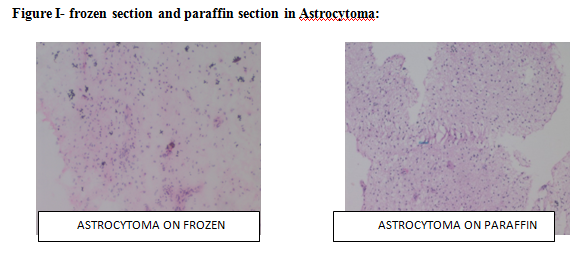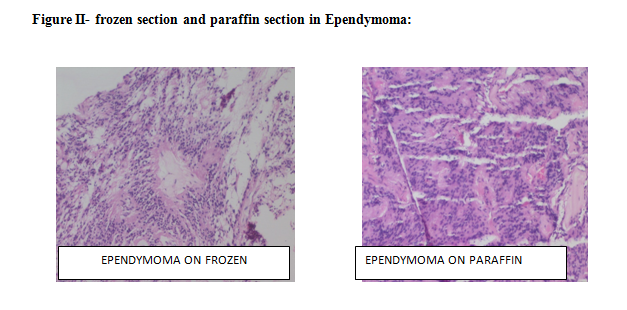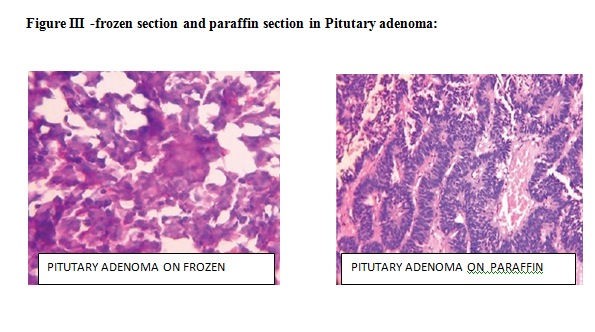Welcome to IJCRR
Indexed and Abstracted in: Crossref, CAS Abstracts, Publons, Google Scholar, Open J-Gate, ROAD, Indian Citation Index (ICI), ResearchGATE, Ulrich's Periodicals Directory, WorldCat (World's largest network of library content and services)
|
LESIONS |
NO OF CASES(130) |
|
|
FROZEN SECTION |
ROUTINE HISTOPATHOLOGY |
|
|
ASTROCYTOMA |
58(44.6%) |
55 |
|
MENINGIOMA |
16(12.3%) |
15 |
|
SCHWANNOMA |
12(9.2%) |
11 |
|
MEDULLOBLASTOMA |
10 (7.6%) |
5 |
|
PITUITARY ADENOMA |
8(6.1%) |
8 |
|
EPENDYMOMA |
7(5.4%) |
5 |
|
OLIGODENDROGLIOMA |
5(3.8%) |
2 |
|
BENIGN CYSTIC LESION |
3 (2.3%) |
3 |
|
HEMANGIOPERICYTOMA |
3 (2.3%) |
2 |
|
CHOROID PLEXUS PAPILLOMA |
2 (1.5%) |
1 |
|
CENTRAL NEUROCYTOMA |
2 (1.5%) |
1 |
|
CRANIOPHARYNGIOMA |
2 (1.5%) |
1 |
|
MALIGNANT ROUND CELL TUMOR |
2 (1.5%) |
1 |
TABLE: II
DEFINITION OF AGREEMENT BETWEEN FROZEN SECTION DIAGNOSIS AND FINAL HISTOPATHOLOGICAL DIAGNOSIS
|
Group 1- complete agreement |
Intraoperative FS and final paraffin section match exactly |
|
Group-2 partial agreement
|
Agreement between FS and final paraffin section but diagnosis of both is too wide to be classified as group-1. FS and final paraffin section does not match exactly but remain in the same WHO group. |
|
Group 3- no agreement |
No agreement between FS and final paraffin section |
|
Group 4- not classifiable |
FS diagnosis of uncertain neoplastic. |
TABLE NO: III
COMPARISION OF CONCORDANCE AND DISCORDANCE RATES WITH RESULTS OF VARIOUS STUDIES
|
|
PRESENT STUDY
|
STUDY DONE BY (Zarbo, et al. 1991)10 |
STUDY DONE BY (Novis, et al. 1996)11 |
|
CONCORDANCE RATE
|
81.5% |
98.3% |
98.2% |
|
DISCORDANCE RATE
|
18.5% |
1.7% |
1.2% |
FIGURES SHOWING HISTOLOGY PICTURE OF FROZEN SECTION AND PARAFFIN SECTION.



References:
Bibliography
1) Intraoperative consultation (frozen section). In: Rosai J, editor. Rosai and Ackerman's Surgical Pathology. 9 th ed. vol 1 ,
2) Tofte K, Berger C, Torp SH, Solheim O. The diagnostic properties of frozen sections in suspected intracranial tumors: A study of 578 consecutive cases. Surgical Neurology International. 2014;5:170. doi:10.4103/2152-7806.146153.
3) Oneson RH, Minke JA, Silverberg SG. Intraoperative pathologic consultation: An audit of 1,000 recent consecutive cases. Am J Surg Pathol 1989?13:23743.
4) Howanitz PJ, Hoffman GG, Zarbo RJ. The accuracy of frozen section diagnoses in 34 hospitals. Arch Pathol Lab Med 1990?114:3559.
5) Rogers C, Klatt EC, Chandrasoma P. Accuracy of frozen section diagnosis in a teaching hospital. Arch Pathol Lab Med 1987?111:5147.
6) Aldape K, Simmons ML, Davis RL, Miike R, Wiencke J, Barger G, et al. Discrepancies in diagnoses of neuroepithelial neoplasms: The San Francisco Bay Area Adult Glioma Study. Cancer. 2000;88:2342-9.
7) Mittler MA, Walters BC, Stopa EG. Observer reliability in histological grading of astrocytoma stereotactic biopsies. J Neurosurg. 1996;85:1091-4.
8) Prayson RA, Agamanolis DP, Cohen ML, Estes ML, Kleinschmidt-DeMasters BK, Abdul-Karim F, et al. Interobserver reproducibility among neuropathologists and surgical pathologists in fibrillary astrocytoma grading. J Neurol Sci. 2000;175:33-9.
9) van den Bent MJ. Interobserver variation of the histopathological diagnosis in clinical trials on glioma: A clinician's perspective. Acta Neuropathol. 2010;120:297-304.
10) Zarbo RJ, Hoffman GG, Howanitz PJ. Interinstitutional comparison of frozen section consultation: A College of American Pathologists Qprobe study of 79,647 consultations in 297 North American institutions. Arch Pathol Lab Med 1991?115:118794.
11) Novis DA, Gephardt GN, Zarbo RJ? College of American Pathologists. Interinstitutional comparison of frozen section consultation in small hospitals: A College of American Pathologists Qprobes study of 18,532 frozen section consultation diagnoses in 233 small hospitals. Arch Pathol Lab Med 1996?120:108793.
Indexed and Abstracted in






Antiplagiarism Policy: IJCRR strongly condemn and discourage practice of plagiarism. All received manuscripts have to pass through "Plagiarism Detection Software" test before forwarding for peer review. We consider "Plagiarism is a crime"
IJCRR Code of Conduct: To achieve a high standard of publication, we adopt Good Publishing Practices (updated in 2022) which are inspired by guidelines provided by Committee on Publication Ethics (COPE), Open Access Scholarly Publishers Association (OASPA) and International Committee of Medical Journal Editors (ICMJE)
Disclaimer: International Journal of Current Research and Review (IJCRR) provides platform for researchers to publish and discuss their original research and review work. IJCRR can not be held responsible for views, opinions and written statements of researchers published in this journal.
International Journal of Current Research and Review (IJCRR) provides platform for researchers to publish and discuss their original research and review work. IJCRR can not be held responsible for views, opinions and written statements of researchers published in this journal
148, IMSR Building, Ayurvedic Layout,
Near NIT Complex, Sakkardara,
Nagpur-24, Maharashtra State, India
editor@ijcrr.com
editor.ijcrr@gmail.com
 This work is licensed under a Creative Commons Attribution-NonCommercial 4.0 International License
This work is licensed under a Creative Commons Attribution-NonCommercial 4.0 International License
Copyright © 2026 IJCRR. Specialized online journals by ubijournal